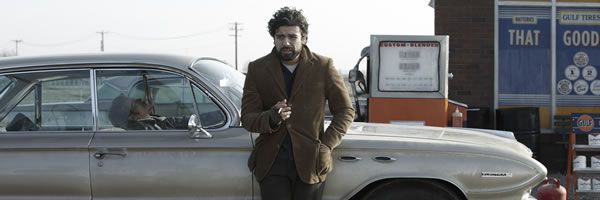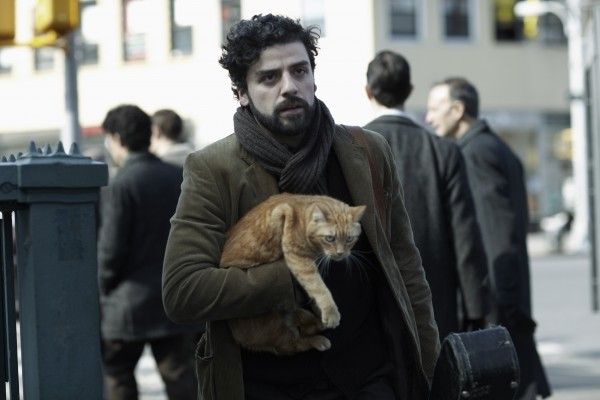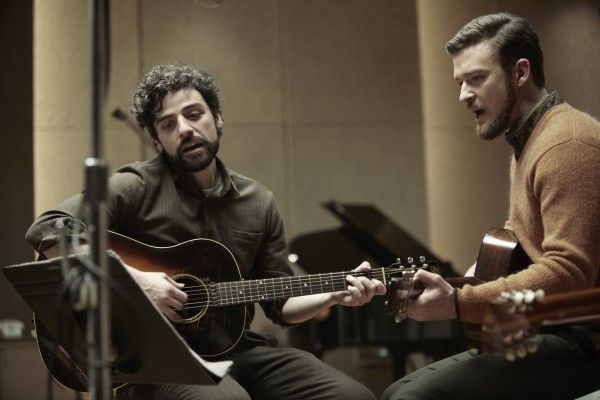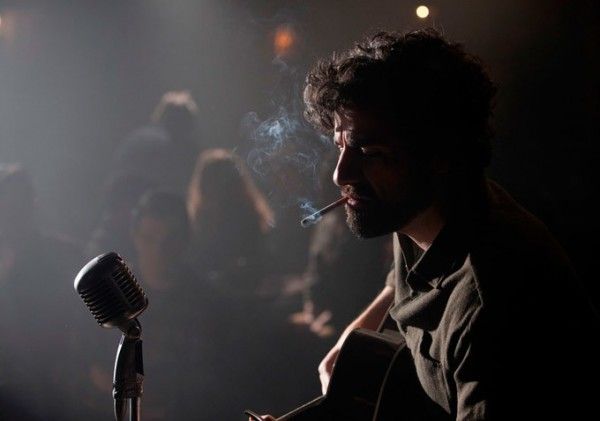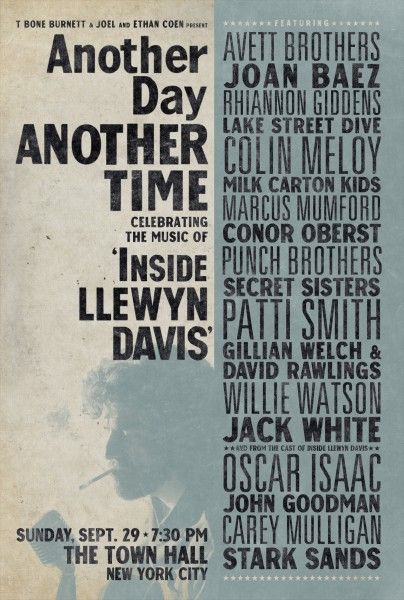From Academy Award winners Joel and Ethan Coen, Inside Llewyn Davis follows folk singer Llewyn Davis (Oscar Isaac), who is struggling to make it in the Greenwich Village folk scene of 1961. Relying on friends for a couch to sleep on and scrounging for whatever work he can find, Llewyn attempts to overcome seemingly insurmountable obstacles, many of which are of his own making, while never really catching a break. The film also stars Carey Mulligan, Justin Timberlake, John Goodman, Garrett Hedlund, F. Murray Abraham, Adam Driver, Stark Sands and Max Casella.
At the film’s press day, actor Oscar Isaac spoke at this roundtable interview about how he prepared for this role, the appeal of working with the Coen brothers, the experience of collaborating with T-Bone Burnett, how being a part of this film has changed the way he plays music now, balancing giving a musical performance with acting in the role, how the film made him grow, as an actor, and how you just can’t expect compliments on your performance when you’re working with the Coens. Check out what he had to say after the jump.
Question: How did you prepare for this role, as a likeable ass?
OSCAR ISAAC: It was an interesting challenge. The writing is such that you have a clue that clearly people are not too happy with Llewyn, or at least the people in his circle. He’s someone that is disconnected and isolated from others. He’s a man unto himself. He’s an island unto himself. Early on, I thought that I wanted to still convey warmth, but just not use any of the traditional means of doing that, like charming someone or ingratiating yourself to someone or even smiling, or any of those kind of things that people normally do. You tell a joke, and then you laugh to let others know you are joking. He doesn’t do any of those things. But at the same time, it was not about being cool and detached. His temperature runs very hot.
First, I thought about the comedy of resilience, and I thought, “Why is it that we laugh at all these hardships that are happening? Is it because we’re sadistic, is it relief that it’s not us, or is it something else?” And I thought of a performer who did that a lot, which is Buster Keaton. All these things are happening to him – these near-death experiences are constantly happening to him – and yet, he presses on and his face is always in this melancholic impasse. What happens when you see that is that it’s a real great suggestion of a rich inner life that’s happening. For me, it was really important to have that constantly happening. The only time he does connect with people and the only time he opens up is when he plays his songs. That’s the only time he really shows a window into where he’s at, emotionally. Otherwise, it’s all just happening inside his head.
Llewyn is an asshole who pretty much alienates every single person around him, but as a performer, you can’t judge him. What was it like to look at the world from Llewyn’s perspective? How does he see the way that people act around him?
ISAAC: I think he thinks they’re assholes. He’s just trying to survive and trying to do his thing. He’s trying to be authentic, and trying to do the right thing, too. [Jean] doesn’t take any responsibility, at all. He didn’t force himself onto her. It does take two to tango. And he still decides to sign away his royalties to pay for an abortion of a child that may not be his because it’s the right thing to do. He decides to walk around with this cat forever because it belongs to the people who let him crash on their couch, even though they exploit him, every now and then. They can be condescending. But, he still decides it’s the right thing to do. I think it’s just a no-win situation. He’s never going to try to ingratiate himself, so that people like him more.
What’s the appeal of the Coen brothers, for you?
ISAAC: They’re my favorite filmmakers. They have been since I first saw Raising Arizona. I remember seeing that movie, as a little kid, and it just blew my little kid mind. It was so funny, but it also made me feel so sad and weird. I think that’s what it is. They do two things. It’s theater about the common man. That’s what they’ve always done. And not only that, but it’s the common man dangling in existence. It’s an investigation of existence, and existence is both desperate and completely absurd, and it’s mysterious and dark and joyful and painful. Those things are constantly happening, sometimes right on top of each other. It is very much like Chekhov. Coen brothers movies are not always what life looks like but it’s definitely what life feels like.
What was it like to collaborate with T-Bone Burnett, and what did you learn from him?
ISAAC: He completely changed the way, not only that I listen to music, but the way that I play music. The first thing we did was that we went out to Tarzana, to Norm’s Rare Guitars, and we found Llewyn’s guitar, which is this guitar from 1924. It’s an L1, which is what rock ‘n’ roll was invited on. We joke that I made a very special deal with T-Bone. And then, he took me back to his home studio and the first thing he did was put on Tom Waits’ new record, and he left the room for an hour. He was the musical Mr. Miyagi. He was the invisible hand that was guiding me and never telling me what to sound like, but just stripping away any artifice.
What was your musical experience, prior to working on this film, and how did it change the way you play music?
ISAAC: I’ve been playing for a long time. I’ve been playing guitar for a very long time, but I’ve never done this particular style of picking, which is called Travis picking. It’s very much like Stride piano or Ragtime, where the bass is constantly going and the right hand is doing all sorts of crazy stuff. You do it with three fingers, so the thumb is the bass and the other two fingers are doing all of the syncopated melodies. And that took a real rewiring of the brain to figure out. I just obsessed over it, and figured it out.
Did you like folk music, going into this, or do you like it better now?
ISAAC: I did. I grew up listening to Dylan, but this was obviously the time before. And I’d heard some Woody Guthrie and some Pete Seeger. But this particular time, I wasn’t aware of. As soon as I dove into it, I’ve been obsessed with it, ever since. I found Karen Dalton, who I wasn’t aware of. I’m just such a huge fan of her music, and what a tragic story. Dave Van Ronk’s repertoire is really what my lifeline was, for this movie. I really clung to that, early on. And it wasn’t dictated that I was supposed to sound like him. Obviously, I’m not playing Dave Van Ronk, but his music just spoke to me, in a very particular way, so I learned a large amount of his repertoire.
How did you balance giving a musical performance with acting in the role?
ISAAC: That was really challenging. What I had decided to do, just for the audition – whoever auditioned had to sing “Hang Me” – was just to sing it like me, with Dave Van Ronk’s arrangement. From there, I assumed there was going to be a panel of experts, with T-Bone heading it, getting me to sound just exactly how they needed me to sound, but that never happened. In fact, it was a much slower organic process. As I investigated the character more and let his circumstances inform who he is, there was a mixing of what my voice is and Llewyn’s voice, and the pressure and the compression that he’s feeling. It’s not like a musical, where the song is an expression of the character and of the plot and of what’s happening. It’s not that, at all. The songs have zero to do with the plot, really. It’s more of a revelation. It’s more of a window in. And they never shoot with long lenses. The cameras were always really close. So, it had to be internal. It had to all be inside. That was a tricky thing.
This film is a mixture of comedy and drama. How did you adapt your performance to strike the right balance between the two?
ISAAC: Rhythm is obviously very important, and a lot of that is written in there. Truthfully, whenever I felt in the absolute most pain, and the most horrible and darkest, is when Joel and Ethan would laugh the loudest. That was my barometer.
What was it like to work with Carey Mulligan again, in a very different dynamic from the one you had in Drive?
ISAAC: She got to let loose everything that was pent up from the other movie. She’s great. She has such a vulnerability, innately, to her. To see her play against that was so fun, but I think you can still see that. I can see why she would have loved him, or why there was something there. Someone who’s that angry is clearly hurt about something.
What did you take away from this job?
ISAAC: Not to look for compliments from the Coens because they don’t give many. That was really refreshing. That first week, you’re like, “They’re not saying if it’s good or not. I hope it’s going okay.” But then, after that first week, you don’t look for it anymore. It’s almost a relief because it’s not about that. It’s not about a constant judgement. It’s just about the work, and about figuring this thing out. It’s a really nice way to work, actually. There’s a reason why actors are always dying to work with the Coens. They just set the stage for you to do their best work. Apart from the movie, I appreciate their friendship, more than anything. They’ve brought me into their world view, and how they feel about art and life. That just made me grow as a person, and obviously as an actor, as well.
Inside Llewyn Davis opens in limited release on December 6th, and nationwide on December 20th.

